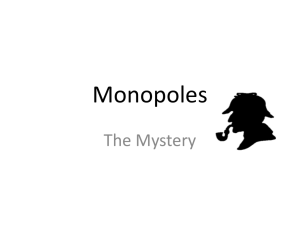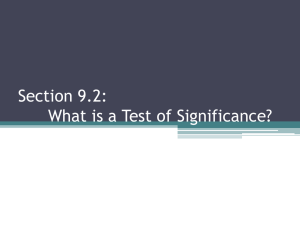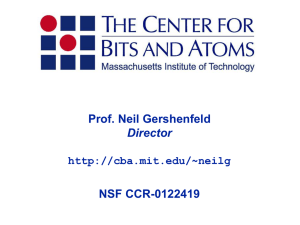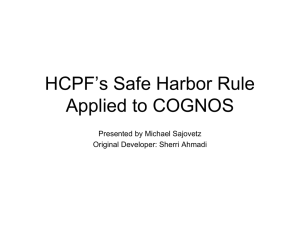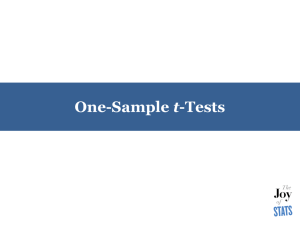gralla
advertisement
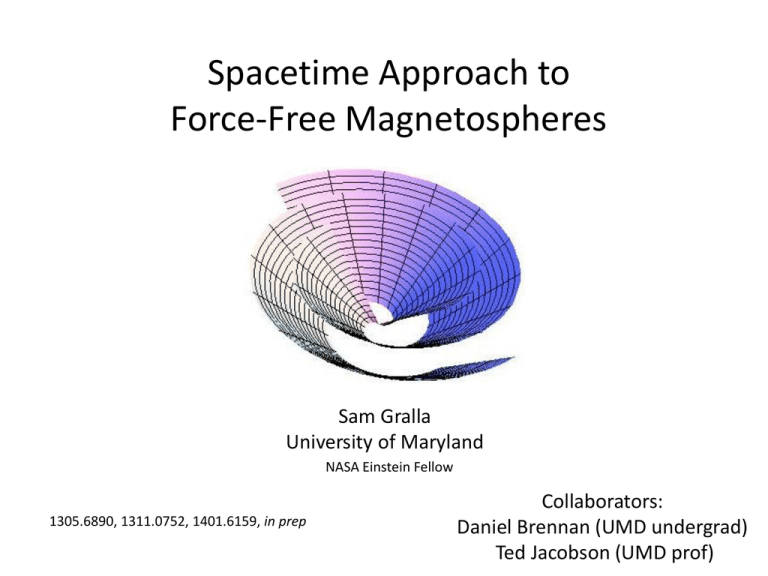
Spacetime Approach to Force-Free Magnetospheres Sam Gralla University of Maryland NASA Einstein Fellow 1305.6890, 1311.0752, 1401.6159, in prep Collaborators: Daniel Brennan (UMD undergrad) Ted Jacobson (UMD prof) Force-Free Electrodynamics Magnetically dominated plasma Pulsars, AGN, … Exact Solution Family Brennan, SEG, Jacobson 2013 SEG & Jacobson 2014 free function of three variables number Talk Outline How did we find this? What is it good for? spacetime approach pulsars, general asymptotic behavior of “free” magnetospheres? What else have we done? In this talk: push the spacetime approach as far as possible… • Field sheet picture • No ingrown hair theorem • varia The Michel Monopole Michel 1973 from Beskin 2010 In split form, can regard as a) toy model for dipole pulsar or b) model for asymptotic pulsar magnetosphere An Observation The Michel monopole has charge and current satisfying In spacetime language, the charge-current four-vector is lightlike or null. This observation is powerful. Null structure is fundamental to spacetime. Menon & Dermer 2007 Family of stationary, axisymmetric exact solutions in Kerr Parametrized by free function Λ(ϴ) E2=B2 These solutions also have null four-current! (Along the so-called principal null congruence(s) of Kerr.) Null-Current Solutions We assumed null current and used the Newman-Penrose formalism, which is designed to leverage null structure. (Brennan, SEG, Jacobson 2013) We found the general solution with null, radial current in flat, Schwarzschild, and Kerr (radial=PNC) spacetimes. We later re-derived the solutions using the language of differential forms, where the calculations are simple and the physical content is clear (to the forms-initiated!) (SEG & Jacobson 2014) forms example: New Solutions The general outgoing solution with radial, null current in flat spacetime is magnetic monopole outgoing Poynting flux non-stationary & non-axisymmetric! (Also valid in Schwarzschild, and we found analogous solutions in Kerr) Michel monopole: 3+1: Three Applications 1. Generalized monopole 2. Asymptotic magnetosphere 3. Non-scattering waves around black holes 1. Generalized Monopole Conducting sphere rotates arbitrarily Michel’s rotating monopole is (No E-field in rotating frame) Whirling monopole: (No E-field in whirling frame) ( Given ) , whirling magnetosphere is The flux agrees with the instantaneous Michel solution. Can model (e.g.) a pulsar glitch Precession: a circular whirl 2. Asymptotic Magnetosphere Conjecture: If outgoing boundary conditions are imposed at infinity, then for any interior boundary conditions the current will be asymptotically null and radial. • Related to Michel’s “minimal torque condition” • Numerical evidence from Kalapotharakos et al 2011 • Evidence against from Tchekhovskoy et al 2013? (any other evidence for/against?) If so, these exact solutions describe the generic far-field behavior of force-free magnetospheres. Could model outgoing kink in field lines originating from a glitch or catastrophic event. 3. Non-Scattering Waves Ingoing version in Schwarzschild (Eddington-Finklestein coordinates) , The free function can specify an initial wave packet… …and the wave just goes in. This was shocking to us! All other kinds of radiation scatter off the black hole. In particular there are no vacuum electromagnetic waves like this. 1. Generalized monopole 2. Asymptotic magnetosphere 3. Non-scattering waves around black holes The Spacetime Approach SEG&Jacobson 2014 Black Hole Split Monopole (Blandford-Znajek solution) Promote the Michel solution to linearized Kerr (BL coordinates), Solves equations provided . (Easily checked in forms approach) Regularity on horizon implies This first order piece is enough to see the energy extraction. Accelerating Monopole (Brennan & SEG 2013) Assume null current along the light cones of an arbitrary timelike worldline. moving magnetic monopole Extra power radiated due to acceleration: Poynting flux Euler Potentials & Field Sheets Carter 1979, Uchida 1997 For a degenerate field F, ( Surfaces of constant ) : worldsheets of magnetic field lines Field sheet metric (SEG&Jacobson 2014) The spacetime metric induces a metric on each field sheet. Particles* move on timelike geodesics of the field sheets Alfven wave group velocity follows field sheet null geodesics In stationary axisymmetry, every field sheet has a Killing vector, field line angular velocity Thus there is a conserved quantity along field sheet geodesics. This is the quantity used to calculate particle wind (e.g. CKF) Where k is null is called a light surface. It’s a causal boundary for particle and Alfven propagation. *neglecting cyclotron, drift, and curvature radiation reaction No Ingrown Hair (MacDonald&Throne 1982; SEG&Jacobson 2014) An astrophysical black hole can’t have its ``own’’ magnetic field. (vacuum, stationary, axisymmetric, no charge = no magnetic field) Force-free generalization: no closed field lines allowed not allowed gray: not force-free Extremal Znajek Condition In the stream equation formulation for stationary, axisymmetric force-free fields in Kerr, there is a regularity condition on the horizon (Znajek 1977), This condition is not sufficient for regularity in the extremal case a=M. There we have an additional condition (SEG&Jacobson2014), Stream Equation for No Poloidal Field The usual Grad-Shafranov approach is built on the assumption of a nonvanishing poloidal magnetic field. If the field vanishes you have a different stream equation (SEG&Jacobson 2014) Chi is the electrostatic potential, See related work of Contopoulos (1995) The Spacetime Approach SEG&Jacobson 2014 We are taking a spacetime approach to force-free magnetospheres. I presented: 1. Time-dependent, non-axisymmetric exact solutions: • Null current (J=ρc) • superposed monopole and Poynting flux • Do these give the general outer magnetosphere? 2. Varia • • • • • Field sheets, symmetries and particle wind No ingrown hair theorem Accelerated monopole Extra Znajek condition for extremal Kerr Stream equation for no poloidal field
